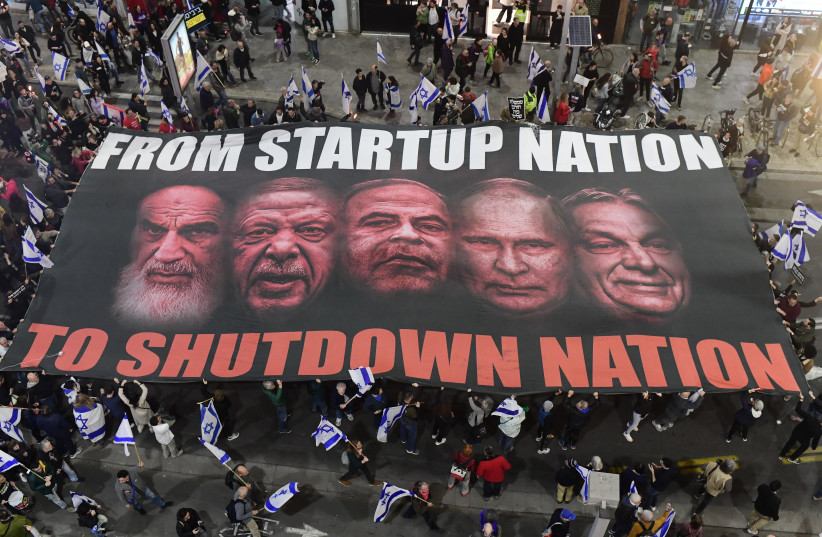Israeli politics offers no respite. Some six weeks after the formation of the government, which followed five rounds of elections in four years, a full-right-wing coalition is in power and opposition to its plans for judicial reform is deafening.
The coalition seeks to strengthen the power of the government and parliament in relation to the Supreme Court, as is customary in many democracies around the world. But some members of the opposition, such as Gideon Sa’ar of the New Hope party, which is part of Benny Gantz’s National Unity faction in the Knesset, who wanted to pass the same reform, are unhappy about the fact that, in the end, it is Prime Minister Benjamin Netanyahu’s right-wing government that is pushing through the reform.
Despite claims to the contrary, since Justice Minister Yariv Levin kicked off his judicial reform initiative there has been no attempt at dialogue by the opposition. Instead, from day one, it has attempted to spread alarming messages, which many in Israel – including this author – view as an attempt at perception engineering. When lies about Israel heading towards a dictatorship are repeated day after day, the falsehoods become ingrained.
The Right, for its part, refuses to properly explain its reform. Levin launched his initiative without clearly explaining that it is the norm in most countries, thereby allowing the opposition to win the cognitive battle. The opposition, meanwhile, is fueled by deep-rooted anti-Netanyahu sentiment.
Every Saturday night, one of the country’s main traffic arteries, Tel Aviv’s Azrieli junction, becomes the site of mass protests held under the slogan that the state is descending into dictatorship. Would a dictatorship permit democratic demonstrations of this size?

Legislation in the Israeli parliament is customarily routed through the Knesset’s Constitution, Law and Justice Committee. Its chairman, Religious Zionist Party MK Simcha Rothman is in the driver’s seat. As he learns about his new role, Rothman must manage a difficult committee. The opposition has not made a single offer to improve the judicial reform proposed by Levin. Its entire mission is to destroy it.
Recent days have seen MKs shouting that the government is wrecking the state, people are fleeing and Israel is turning into a dictatorship but they make no specific recommendations for improvement. MKs have been thrown out of committees and backbencher opposition parliamentarians with no real achievements to their name were seen jumping up on tables and acting like wild beasts.
These images are a gift to Israel’s enemies, who see us Israelis as destroying ourselves from within. All they want is for Israelis to fight each other.
A key factor behind many of these scenes is the left-wing camp’s inability to accept Netanyahu’s election as prime minister. On February 13, a 100,000-person rally was held outside the Knesset, in Jerusalem.
Not everyone is on the same page
A glance at some of these demonstrations and the statements heard there reveals that not everyone is aware of the details of judicial reform and the strategy for strengthening the executive branch. However, the protests serve the Left’s leaders and the anti-Netanyahu contempt that they promote.
THE DAY before the protest at the Knesset, President Isaac Herzog, a former leader of the Center-Left Labor party, proposed a compromise formula on judicial reform and urged both sides to engage in dialogue.
He requested that the legislation be halted for two weeks. Days later, on February 15, a freeze on the first part of the reform program was announced. However, that freeze could be short-term. The Right is unwilling to stop legislation at this stage but it is willing to engage in dialogue. Legislation takes months.
The leaders of the Left, who have made no counter-proposals in the Constitution Committee, instead preferring to post videos of their clashes with the Right at the committee, has led the Right to lose faith in the Left’s desire for dialogue. The Right has concluded that the Left is instead seeking a victory picture.
The images unfolding in Israel these days are extraordinary. Masses of people are out on the streets, the media is backing the opposition and therefore, it doesn’t matter how much the Right is convinced of its cause, it can’t ignore what is happening. At this point, Netanyahu is entering the picture and is looking for a way to rearrange the situation and end the crisis.
The coalition, therefore, has begun striking a more conciliatory tone, saying that reform isn’t perfect but also that it’s not going away.
Attorney-General Gali Biharav-Miara, meanwhile, is not allowing Netanyahu to discuss the judicial reform, due to his legal affairs. This has caused bad blood between her and the government. This situation is approaching a stalemate.
While Netanyahu is absent from the judicial argument, chaos continues and this serves the opposition’s efforts to destabilize the government. Regardless of how much the opposition claims it is working for the benefit of the state, this chaos serves it politically.
The Right must learn a valuable lesson about the need for effective explanation. If it explained its case in a smart and pleasant manner with the same vigor as the Left pursues its cause, it wouldn’t be in this poor situation of having to explain things in retrospect.
New and dramatic developments can be expected: The chaos cannot continue.
The writer is a publishing expert at The MirYam Institute. She is a leading political commentator and panelist on current affairs television programs, including Channel 13’s daily Israel This Morning show. She is a columnist in the Maariv newspaper’s weekend edition and a communications lecturer.
